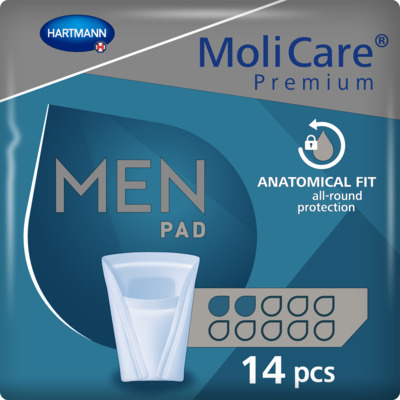Incontinence Advice
Bowel cancer and incontinence: what you need to know
Learn about the different aspects of bowel cancer and its relationship to incontinence in this informative article. Discover the early signs, symptoms, risk factors, and more. Don't let embarrassment keep you from seeking the help you need. MoliCare's Premium Form Stool is a purpose designed pad for faecal incontinence available to buy online if you or someone you care for is experiencing this problem.

In this article
- What is bowel cancer symptoms
- What is bowel cancer?
- What are the early signs of bowel cancer?
- Causes
- Can bowel cancer be hereditary?
- Can bowel cancer be detected in a blood test?
- Can bowel cancer be cured?
- What are the main risk factors for bowel cancer?
- Is Incontinence a sign of bowel cancer?
- Does Bowel Cancer Cause Incontinence?
- Conclusion
What is bowel cancer?
Bowel cancer is cancer that begins in the colon (large bowel) or the rectum (back passage). Its medical title is colorectal cancer. All cancers emerge when abnormal cells uncontrollably divide and grow. The cells can grow into the tissue or organs that surround them, and from here spread to other parts of the body.
Your treatment will depend on where cancer starts. The treatment for colon cancer may be different from that for rectal cancers.
The colon is part of the large bowel and is around five feet long, which is split into four parts:
- ascending colon,
- transverse colon,
- descending colon and
- sigmoid colon.
Our rectum is part of the passage that stores stool (poo) until it is ready to be passed out of the body into the toilet. Anal cancers begin at our anus, and small bowel cancers begin between the stomach and the large bowel.
What are the early signs of bowel cancer?
Early intervention is essential for successful treatment of the disease. It is vital that you don‘t ignore the early signs of bowel cancer.
According to Bowel Cancer UK, the symptoms can include:
- Bleeding from your bottom
- Blood in the stool
- A change in bowel habit that persists and cannot be explained
- Unexplained weight loss
- Unexpected extreme tiredness
- Pain in your stomach/ lump in your stomach
Most people suffering one or more of these symptoms will not be diagnosed with bowel cancer, as many health problems have similar symptoms. However, it is still essential that you go to the doctors for an investigation, even if you suspect it is something else.
Incontinence Product Finder
Selecting the right products is key in ensuring security and discretion. If you’re not quite sure what you need, try our product finder. It’ll ask you a few questions about your needs and then provide a list of recommended products that may help you.
Find Product Incontinence Product FinderWhat are bowel cancer symptoms?
Most people who are eventually diagnosed with bowel cancer have one of the following combinations of symptoms:
- Blood in the stools (poo)
- Changes in bowel habit – such as more frequent, looser stools
- Abdominal (tummy) pain
It's important to remember that these symptoms are very common and often caused by other things, like hemorrhoids (piles) or something you've eaten.
As almost 9 out of 10 people with bowel cancer are over the age of 60, these symptoms are more important as people get older.
Don't hesitate to speak to your healthcare provider if you're concerned.
Any changes in toilet habits, extreme fatigue and sudden weight loss should also signal a concern. Although these are more generic symptoms, they are an early indicator of problems, and you need to see a GP. Even if all you are saying is that you don’t feel right, trust your instincts and get a check-up.
What causes bowel cancer?
The exact cause of bowel cancer is currently unknown. However, things called ‚risk factors‘ can increase the chance of a person developing it. Having one or more risk factors does not mean you will definitely get bowel cancer. And if you do not have any risk factors, this does not mean you will not get bowel cancer.
- Age: Bowel cancer is more common in older people. In the UK, around 4 in 10 bowel cancer cases (44%) each year are diagnosed in people aged 75 and over. (https://www.macmillan.org.uk/)
- A strong family history of bowel cancer
- A history of non-cancerous growths (polyps) in your bowel
- Longstanding inflammatory bowel disease such as Crohn’s disease or ulcerative colitis
- Type 2 diabetes
- An unhealthy lifestyle
The most significant risk factor for bowel cancer is age. 90% of cases of bowel cancer occur in those over the age of 60.
However, other lifestyle factors can contribute to your chances of developing bowel cancer. If you eat a diet high in red or processed meats but low in fibre, then you increase your risk. Obesity is also a significant risk factor. Bowel cancer is more common in people who are overweight and those with a sedentary (unactive) lifestyle. Therefore, exercise and a balanced diet can help to reduce the risk.
Although there are risk factors, there is no definitive answer as to what causes bowel cancer. Therefore, even if you are in your 40s, living a healthy life with a healthy, balanced diet, if you experience the symptoms described, you should seek help.

Can bowel cancer be hereditary?
Family history – having a close relative (mother or father, brother or sister) who developed bowel cancer under the age of 50 may put you at a greater lifetime risk of developing the condition.
Some people have an increased risk of bowel cancer because they have another condition that affects their bowel, such as severe ulcerative colitis or Crohn's disease, over a long period of time.
If you develop bowel cancer before the age of 50, there is a chance you have Lynch syndrome. The medical name for Lynch syndrome is hereditary non-polyposis colorectal cancer (HNPCC). It is thought this is a result of several potential inherited gene mutations. Alternatively, if there are a cluster of cases of bowel cancer in a family if could be a condition called familial adenomatous polyposis (FAP).
However, hereditary bowel cancers are relatively uncommon. The NHS note that these two inherited conditions are considered rare.
Can bowel cancer be detected in a blood test?
If your doctor suspects you may have colon cancer, they may recommend the following tests and procedures to confirm the diagnosis:
- Colonoscopy: Using a scope to examine the inside of your colon. Colonoscopy uses a long, flexible and slender tube attached to a video camera and monitor to view your entire colon and rectum.
- Biopsies: If any suspicious areas are found, your doctor can pass surgical tools through the tube to take tissue samples for analysis and remove polyps.
- Blood tests. No blood test can tell you if you have colon cancer. But your doctor may test your blood for clues about your overall health, such as kidney and liver function tests.
Your doctor may also test your blood for a chemical sometimes produced by colon cancers (carcinoembryonic antigen, or CEA). Tracked over time, the level of CEA in your blood may help your doctor understand your prognosis and whether your cancer is responding to treatment.

Can bowel cancer be cured?
The importance placed on early detection is due to the chances for a cure. If your colon cancer is detected early, then it is possible that the treatment you receive could result in a cure.
However, the chance of a complete cure isn’t always possible, and there is a higher chance of cancer reoccurring later in life.
The later the diagnosis and the more advanced the condition, the more unlikely a cure becomes. If colon cancer cannot be completely removed by surgery, then a cure is considered highly unlikely. Seeing your GP as early as possible is essential if there is to be hope for this cure.
Is bowel cancer treatable?
It is vital to differentiate between the terms curable and treatable. It is possible to treat bowel cancer and so live with the condition, even though you are unlikely to be cured. Stage IV bowel cancer is often not curable, but your doctors may be confident with a combination of surgery, radiotherapy and chemotherapy that your disease can be managed. The doctors can also prescribe medicines that will help to ease the symptoms and make living with bowel cancer bearable.What are the main risk factors for bowel cancer?
The most significant risk factor for bowel cancer is age. Nine out of ten diagnoses of bowel cancer are in people over the age of 60.
You can increase your risk for bowel cancer by:
- Eating a lot of red or unprocessed meats
- Failing to balance meat-eating with adequate high fibre foods
- Being overweight or obese
- Failing to exercise, therefore leading a sedentary lifestyle
Is Bowel Incontinence a Sign of Cancer?
Bowel leakage is rarely a sign of cancer. In cases where bowel leakage is caused by a condition such as irritable bowel syndrome or muscle weakness, gaining control of the underlying condition can help improve bowel control. Strengthening exercises and medications can help reduce the frequency of bowel leakage, and absorbent pads can make the condition less disruptive.
While bowel leakage can be embarrassing, it’s a common condition. Most causes aren’t serious, but it’s essential to see a doctor to pin down the cause and determine the appropriate treatments.
At Hartmann Direct, we understand how challenging incontinence can be, and we are committed to providing you with the best possible care and support. Our wide range of continence aids, including pads, fixation pants, and incontinence bed pads, are designed to help you manage your symptoms and maintain your comfort and dignity. Additionally, our disinfection and skincare products can help you maintain a clean and healthy environment, reducing the risk of infection and skin irritation.
Visit our webshop to find a suitable product and subscribe to our newsletter today to take the first step towards greater comfort and confidence.
Does Bowel Cancer Cause Incontinence?
Bowel cancer may result in faecal incontinence or the accidental loss of stools or gas. Changes in toilet habit can be an early sign of bowel cancer due to the presence of obstructions in the bowel. However, surgery such as a colonic resection to remove the tumour, as well as pelvic radiotherapy, can also result in incontinence. Your doctor will help you manage these conditions by suggesting a change to your diet and through the prescription of medications.Conclusion
A diagnosis of bowel cancer can be a dramatic experience. Additionally, consequential faecal incontinence can be highly distressing. The key message of this guide is that early detection is essential. The earlier the cancer is found, the more treatable, and potentially curable, the condition becomes. Therefore, if you are experiencing unusual toilet habits, especially if you see blood in the toilet, you should make an appointment to see a GP.
The other message is that you can manage your risk factors now. While some conditions are hereditary, they are rare. Although you cannot stop the natural aging process, you can manage your diet, exercise, and overall lifestyle.
Check out our new articles about maintaining an active lifestyle with incontinence: "Sport with Incontinence" and "How Anxiety Affects Your Bladder and Bowel". A healthier lifestyle can lead to a more robust bowel as well.
Sources:
- https://www.nhs.uk/conditions/bowel-cancer/
- https://www.bowelcancerresearch.org/faecal-incontinence
- https://www.webmd.com/colorectal-cancer/symptoms-colorectal-cancer
- https://www.bowelcanceruk.org.uk/about-bowel-cancer/symptoms/
- https://www.cancerresearchuk.org/about-cancer/bowel-cancer/about-bowel-cancer
- https://www.bowelcanceruk.org.uk/
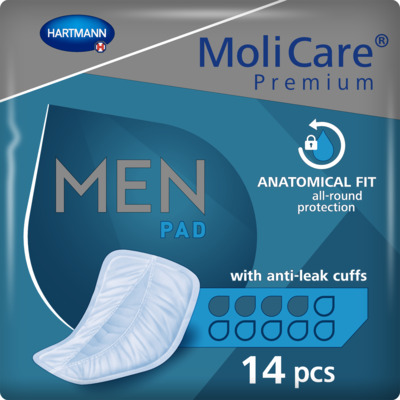
MoliCare® Premium Men Pad 4 Drops
<h2>Comfortable and absorbent</h2> <p>Why MoliCare for men? Hers are some of the key features of the MoliCare® Premium Men Pads from Hartmann:</p> <ul> <li>Discreet and comfortable</li> <li>Fits the male physique</li> <li>3-layer absorbent core</li> <li>Fast-absorbing system</li> <li>Anti-leakage cuffs</li> <li>Odour neutralisers</li> <li>Wide adhesive strip</li> <li>Skin-friendly</li> </ul> <p>With an affordable price and great quality guarantee, you cannot regret choosing MoliCare® Premium Men Pad 4 drops, equipped with anti-leak cuffs, and 14 pieces per bag.</p> <h2>Slim and discreet under clothing</h2> <p>MoliCare® Premium MEN Pads offer reliable support for men dealing with bladder weakness. Whether it's stress incontinence or urge incontinence, these pads for men are designed to provide a discreet and quick solution on the go. Simply place the pad before applying your underwear and secure it with the adhesive strip for worry-free protection. MoliCare® Premium MEN Pads offer full coverage for men facing very light to moderate bladder weakness.</p> <h2>Leakage protection for men</h2> <p>MoliCare® understands that each individual's incontinence needs are unique. That's why our incontinence products, including MoliCare® Premium MEN Pads, are available in different absorbency levels. You can find the perfect fit and protection for your specific requirements.</p> <h2>Reliable and soft on the skin</h2> <p>Our body-shaped absorbent pads are designed to deliver dependable and skin-friendly incontinence protection every day. Experience discreet comfort with the soft, cotton-like materials and the added benefit of an odour neutraliser, ensuring you feel fresh and confident throughout the day.</p> <h2>Fast delivery to your home</h2> <p>At HARTMANN Direct, we ensure a fast delivery service for all our products. Enjoy free delivery on orders over £50, making it convenient and hassle-free to receive the incontinence products you need. Our dedicated customer care team is here to discuss your incontinence product needs and answer any questions you may have. Call us today on 0800 028 9470 to experience the comfort and confidence that MoliCare® Premium MEN Pads can provide.</p>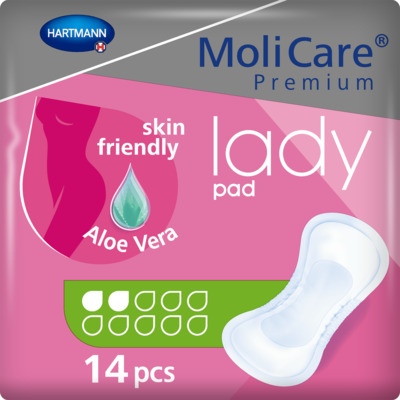
MoliCare® Premium Lady Pad 2 Drops
<h2>Skin Friendly Pant Liners</h2> <p>For women that experience slight incontinence and bladder weakness, across different age groups, it can be a challenge to find the right bladder weakness product that is easy to apply and wear without the worry of potential leakages. Fortunately, we understand this approach, hence why we are happy to offer our MoliCare® Premium Lady Pad 2 drops, that is skin-friendly, Aloe Vera applied, and comes with 14 liners per bag.</p> <h2>Slim and discreet liners</h2> <p>Whether dealing with stress incontinence or urge incontinence, these panty liners offer a discreet and easy solution on the go. Simply place the pad in your underwear and secure it with the adhesive strip for all-round protection. Available in different absorbency levels, MoliCare® bladder weakness products cater to all levels of bladder weakness, ensuring secure care.</p> <h2>Control Bladder Weakness</h2> <p>Enjoy the benefits of these body-shaped absorbent panty liners, designed for women with bladder weakness. The pads offer discreet, reliable protection with features including odour control and fast absorption.</p> <p>With a wide adhesive strip, you can comfortably fix the pad in your regular underwear, providing secure and comfortable fixation. The pads are skin-friendly, featuring soft, breathable materials, including foam cuffs, and a top sheet treated with Aloe Vera.</p> <p>Keeping your skin healthy is a priority, which is why MoliCare® Premium Lady Pads have a skin-neutral pH value of 5.5 and an antibacterial finish. They are also dermatologically tested, offering peace of mind.</p> <h2>Buy pant liners online</h2> <p>Never worry about running out with our convenient order service and fast delivery direct to your door. Enjoy free shipping on orders over £50.</p> <p>If you need assistance, our professional customer service team is here to support you in choosing the right product. Reach out to us today at 0800 028 9470 and experience the comfort and reliability of MoliCare® Premium Lady Pads.</p>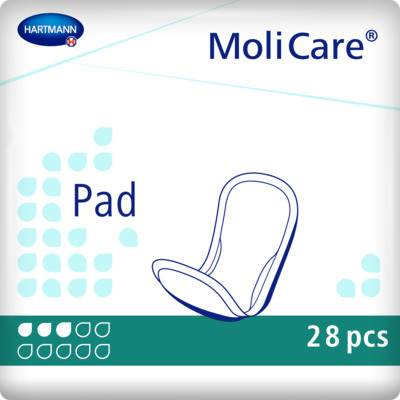
MoliCare Pad 3 Drops
<h2>Incontinence pads for men and women</h2> <p>Protect yourself against slight bladder weakness with the MoliCare® Pad 3 drops. Suitable for men and women, offering an ideal solution to regain control and live your active life without interruptions. Slimline, discreet, and contoured to fit your body, these incontinence pads ensure a comfortable and barely noticeable feel, providing exceptional dryness and protection for slight incontinence.</p> <p>Crafted with soft, skin-friendly fabric and a polyester backsheet, these incontinence pads ensure you can confidently go about your day, secure against minor leaks. The wide adhesive fixing strip keeps the pad securely in place, while the super absorbent core wicks moisture away from your skin. The elastic anti-leak edging adds an extra layer of reassurance, and odour neutraliser keeps you feeling fresh and confident. With the MoliCare® Pad 3 drops, you no longer need to let slight or occasional incontinence hold you back from enjoying life to the fullest. Simply adhere the pad to your underwear, and you will barely feel the difference.</p> <h2>Price match promise</h2> <p>Experience convenience with our fast delivery service, bringing your chosen products directly to your door. At HARTMANN Direct, we offer a price match promise and free delivery for orders over £50, making sure you receive both quality and value.</p> <p>If you need further assistance, our customer care team is here to help. Give us a call today at 0800 028 9470, and we'll find the perfect incontinence product tailored to your needs. Take charge of your life with the reliable and comfortable protection of MoliCare® Pad 3 drops. Say goodbye to worries and hello to an active and confident lifestyle.</p>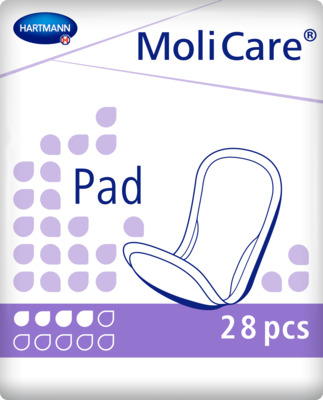
MoliCare Pad 4 Drops
<h2>Handy MoliCare incontinence pads to carry on the go</h2> <p>Our MoliCare® Pad 4 Drops are an essential product for those experiencing slight incontinence, allowing you to regain control and live your busy and active life without the interference of bladder weakness. Designed for both men and women, this incontinence pad for men and women offers exceptional dryness and protection, ensuring your comfort and confidence.</p> <h2>‘Barely There’ Reassurance and Reliability</h2> <p>The MoliCare® Pad 4 Drops are slimline, discreet, and adjusted to fit your body seamlessly. It fixes securely inside your underwear, providing a ‘barely there’ comfort feel. With its soft and skin-kind fabric, along with a wide adhesive fixing strip on the backsheet, you can go about your day with the assurance of being protected against leakages.</p> <p>The absorbent core effectively prevents your skin from becoming too moist, while the elastic anti-leak edging adds an extra layer of security and peace of mind. Say goodbye to any worries about odours, as the MoliCare® Pad 4 Drops also neutralises odours to keep you fresh and confident throughout the day. Don't let incontinence hold you back from living life to the fullest.</p> <p>Ordering your MoliCare® Pad 4 Drops is hassle-free, as we offer fast delivery direct to your door. With our price match promise, you can trust that you're getting the best value for your money. Plus, enjoy free delivery on all orders over £50.</p> <p>If you need assistance in finding the perfect incontinence product for your needs, our friendly customer care team is here to help. Don't hesitate to reach out to us at 0800 028 9470. Take control of your life with the reliable protection and comfort of the MoliCare® Pad, alongside other <a href="https://www.hartmanndirect.co.uk/incontinence-products/incontinence-pads" style="color:#0563c1; text-decoration:underline">incontinence pads</a>.</p>